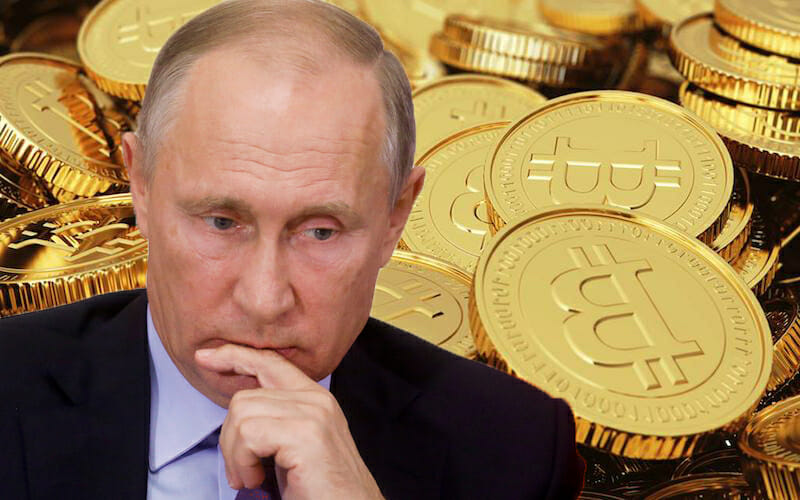
Are You Ready for the Cryptocurrency Wars?
A week after Vladimir Putin strongly criticized Bitcoin and other private cryptocurrencies, Moscow announced it will be unleashing a CryptoRuble of its own. Nikolay Nikiforov, Russia’s minister of communications, explained that this move is partly motivated by a desire to get ahead of other governments: “I confidently declare that we run CryptoRuble for one simple reason: if we do not, then after two months our neighbors in the EurAsEC will.”
In doing so, Russia is following the lead of another country that is also hostile to private crypto: China. Last July the People’s Bank of China became the first central bank to announce it had developed a crypto-prototype that it plans to offer alongside the traditional renminbi. That the first forays into state-backed cryptocurrency comes from two countries with a history of restricting a free and open internet is not surprising. While Bitcoin originated as a way to opt out of government control of money supply, increasingly governments see the underlying technology as a way to increase their control of the economy.
Not to be left behind, the IMF — which, according to Jim Rickards, is preparing to replace the U.S. dollar as the next global reserve currency — recently opened the door to issuing their own cryptocurrency in the future. While some crypto-advocates have naively celebrated recent comments by Christine Lagarde on the future potential of digital currency, such praise simply reflects the increasing awareness on the part of technocrats that finance is changing and that they must be prepared for it. Considering central banks around the world have continued to advance their war on cash, it is not surprising to see Lagarde and others adapt to the concept so quickly. The usefulness of state-controlled cryptocurrency is why, moving forward, we should expect increased scrutiny and regulation on private exchanges.
It’s been reported that the Chinese government, which shutdown private crypto-exchanges in September, is looking into re-opening exchanges with increased regulation. Russia, too, is working on exchange regulation, rather than an outright ban. This apparent change in direction may be the consequence of China’s exchange ban resulting in an increased use of peer-to-peer platforms in the face of government crackdown. For the same reason that government prefers regulated bank accounts to cash and safes, state officials may recognize the benefit to propping up licensed exchanges. Some crypto-exchanges have been compelled to hand over sensitive customer information in exchange for government-issued licenses. Much like banks, these exchanges are increasingly being enlisted as tax collectors for the government.
While this loss of privacy may outrage Bitcoin’s initial supporters, it’s understandable why many current holders may be perfectly happy with these developments. While much of Bitcoin’s initial appeal was its usefulness in black markets, a major reason for its astronomical rise in value is its increasing appeal among average customers who were never all that concerned with financial services regulation. Japan, for example, saw a major surge in retailers accepting Bitcoin once a firm regulatory framework was implemented.
It is worth wondering whether this harmony between government and consumers will continue, however, once state-controlled crypto truly ramps up. After all, we’ve already seen government rely upon the traditional boogeymen of terrorists, drug dealers, and other criminals as justification for their increased control. The increasing use of Bitcoin by hackers and extortionists provides a modern-day twist to these age-old scare tactics. Is it all that difficult to foresee a scenario in which governments attempt to freeze all regulated exchanges in the aftermath of a terrorist attack or some other similar scenario? It’s even conceivable that they would go one step further and legally mandate replacing a privately-held asset for a government-issued currency.
The example of China demonstrates that the inherently decentralized nature of Bitcoin will likely always ensure a degree of functionality beyond the reach of government. At the same time, the popular appeal of cryptocurrency also means increasing reliance on third-party services and fewer individuals securing their investments in private wallets. Since the most popular — and thus the most lucrative — exchanges and other services have an inherent incentive to maintain a good relationship with legal authorities, it is easy to see how this easily plays to the benefit of government officials. Already within the industry debate is raging between those who prioritize “efficiency” and mainstream appeal — even at the expense of crypto’s decentralized origins. Luckily, Bitcoin’s original Austro-libertarian ethos means that we are likely to see major industry influence pushing back against state control.
In the meantime, this is yet another reason why what little political capital libertarians have should not be wasted pursuing moderate reforms such as forcing the Fed to embrace rules-based monetary policy. According to libertarians, there is no hope to ever transform the Federal Reserve into a useful — or even non-harmful — institution. That hope does exist, however, when it comes to cryptocurrency. As President Trump rolls out his Federal Reserve nominations, monetary policy will soon become a major topic of conversation. For libertarians, it will represent a significant setback should Senator Rand Paul and other Fed-skeptics fail to press the issue on the need for competition in currencies.
The recent surge in states that have legalized the use of gold and silver for the payment of debt means there has never been a stronger political case for the elimination of legal tender laws and the taxes imposed on alternative currencies, like the kind Ron Paul proposed when he was in Congress. Such a move now could help set the stage for America being a true safe haven for private cryptos in the future.
Doing so may give the cryptocurrency industry the freedom to give us a fighting chance to truly end the Fed and their clones around the world. While those disinclined to see the Fed in a negative light might see the reasoning here as confused, and while others might criticize private cryptocurrency on the same grounds that I’ve criticized state-controlled crypto, the libertarian position envisions serious danger ahead should states get a chance to lock up crypto according to their own designs.

